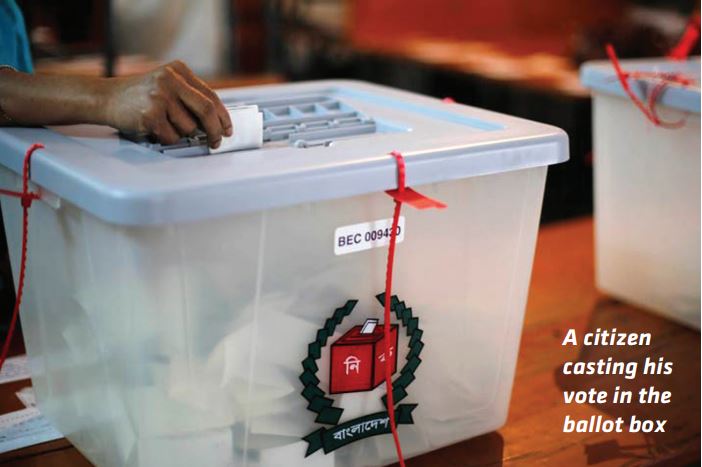Bangladesh is now heading towards the general election. If everything goes well, the 12th Jatiya Sangsad elections will be held on January 7, 2024. Holding a free, fair and participatory national election depends on numerous factors. If all those factors positively cooperate to attain the desired objective, it may surely be achieved fairly well. The role of the Election Commission as well as the role of the administration.
You can also read: BGB and RAB Deployments Signal Government’s Resolute Stand
The Cabinet Division has issued three directives to the administration to ensure the smooth conduct of the 12th national parliamentary election.
A letter comprehending these directives has been forwarded from the Cabinet Division on Thursday (23rd November 2023) to all levels of administration, including ministries, departments, field administration, and the police.
The letter underscores the national responsibility of conducting the 12th national election in a free, fair, and neutral manner, with the Election Commission Secretariat seeking cooperation from all stakeholders in attaining this goal.
In this regard, three actions have been outlined in the letter to smooth the unified execution of the 12th National Parliamentary election:
- The administration is instructed to deliver assistance and cooperation to the Election Commission by neutrally carrying out the duties allocated in the upcoming election program, adhering to the law and rules. Instant directions are to be given to the officers and employees under them from several ministries, divisions, departments, offices, or organizations for this purpose.
- Same instructions are to be issued by the Ministry of Education or the Ministry of Primary and Mass Education to teachers working in government, government-aided, and private educational institutions.
- To ensure the uninterrupted progress of election-related tasks, all ministries, departments, government, semi-government, and autonomous entities, along with organizations, are mandated to provide leave or transfer employees to alternate roles until the conclusion of election duties. All other responsibilities must be put on hold, refraining from undertaking any duty during this crucial period.
The letter mentions Article 126 of the Constitution and Article 5 of the Representation of the People Order, 1972, affirming the duty of administrative authorities and all concerned to collaborate with the Election Commission in the election method.
Highlights of the Directives
- Administration instructed to impartially support EC duties, issuing immediate instructions to staff
- Ministries directed to guide teachers for election duties in government, aided, and private institutions
- Temporary leave/transfers for staff involved in election-related tasks across ministries, departments, and institutions
- Citing Constitutional Articles and Election Order, emphasizing cooperation with the Election Commission
- Election officers considered on deputation under the EC’s control until relieved from duty, prioritizing election responsibilities
Election Commission Mandates
Furthermore, in accordance with Article 446 of the Representation of the People Order, 1972, any officer or employee specified in the mentioned article cannot undergo a transfer to a different location without the explicit permission of the Election Commission until 15 days subsequent to the issuance of the election schedule.
Moreover, the letter highlights the provisions laid out in the Electoral Officers (Special Provisions) Act, 1991, emphasizing the importance of discipline and control of election officers to ensure the conduct of free, fair, and impartial elections.
Officers or employees entrusted with election-related responsibilities will be considered as functioning on deputation under the Election Commission as an additional duty until relieved of their election duties. They are expected to adhere to the authority of the Election Commission and the returning officer, complying with all lawful orders or directives. While serving on deputation, their electoral responsibilities will take precedence, requiring prompt compliance with any instructions from the returning officer.

Maximizing Election Efficiency
The importance of appointing presiding or assistant presiding officers from personnel within ministries, departments, governmental, semi-governmental, and autonomous bodies for efficient election handling. Moreover, teachers across government, aided, and private educational institutions might receive various election duties.
The collaboration of both government and private sector employees is crucial for the smooth conduct of election-related tasks. They’re strongly encouraged to support the Election Commission by fulfilling their duties. Additionally, the letter underscores the Electoral Officers (Special Provisions) Act, 1991, which maintains order among election officers, ensuring impartial elections.
They must adhere to the Commission and returning officer’s directives, prioritizing electoral responsibilities and promptly following instructions.
Preparing for the election (parliament)
For the election of a Constituency Member, the Commission designates a Returning Officer for each constituency, with the possibility of a person overseeing multiple constituencies. Additionally, the Commission has the authority to appoint as many Assistant Returning Officers as needed. Traditionally, Deputy Commissioners (DCs) and Thana/Upzila Nirbahi Officers (T/UNOs) serve as Returning Officers (ROs) and Assistant Returning Officers (AROs) respectively. As per the law, an individual cannot be designated as an Assistant Returning Officer for more than one constituency.
The duties of a Returning Officer encompass all necessary actions for conducting an election in compliance with the laws and regulations. Under the oversight, guidance, and control of the Commission, the Returning Officer manages all activities within their jurisdiction in the district related to the election process. Additionally, they undertake other responsibilities entrusted to them by the Commission.
To facilitate the election of a Constituency Member, the Commission designates a Returning Officer for each constituency, allowing for the possibility of an individual overseeing multiple constituencies. Additionally, the Commission has the authority to appoint as many Assistant Returning Officers as required. Traditionally, DCs (Deputy Commissioners) and T/UNOs (Thana/Upzila Nirbahi Officers) serve as ROs (Returning Officers) and AROs (Assistant Returning Officers) respectively. As per legal provisions, an individual cannot serve as an Assistant Returning Officer for more than one constituency.
The purpose of holding election for constituting Parliament, the Commission holds dialogue with the political parties for the election schedule and by notification in the official Gazette, calls upon the electors to elect a member from each constituency and specifies, in relation to each constituency.


